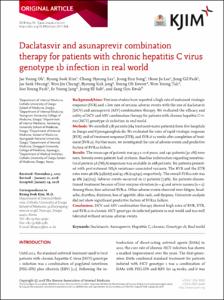KUMEL Repository
1. Journal Papers (연구논문)
1. School of Medicine (의과대학)
Dept. of Internal Medicine (내과학)
Daclatasvir and asunaprevir combination therapy for patients with chronic hepatitis C virus genotype 1b infection in real world
- Keimyung Author(s)
- Chung, Woo Jin; Jang, Byoung Kuk; Hwang, Jae Seok
- Department
- Dept. of Internal Medicine (내과학)
- Journal Title
- Korean Journal of Internal Medicine
- Issued Date
- 2018
- Keyword
- Asunaprevir; Daclatasvir; Genotype 1b; Hepatitis C; chronic; Real world
- Abstract
- Background/Aims:
Previous studies have reported a high rate of sustained virologic response (SVR) and a low rate of serious adverse events with the use of daclatasvir (DCV) and asunaprevir (ASV) combination therapy. We evaluated the efficacy and safety of DCV and ASV combination therapy for patients with chronic hepatitis C virus (HCV) genotype 1b infection in real world.
Methods:
We enrolled 278 patients (184 treatment-naïve patients) from five hospitals in Daegu and Gyeongsangbuk-do. We evaluated the rates of rapid virologic response (RVR), end-of-treatment response (ETR), and SVR at 12 weeks after completion of treatment (SVR12). Furthermore, we investigated the rate of adverse events and predictive factors of SVR12 failure.
Results:
The mean age of patients was 59.5 ± 10.6 years, and 140 patients (50.2%) were men. Seventy-seven patients had cirrhosis. Baseline information regarding nonstructural protein 5A (NS5A) sequences was available in 268 patients. Six patients presented with pretreatment NS5A resistance-associated variants. The RVR and the ETR rates were 96.6% (258/267) and 95.2% (223/232), respectively. The overall SVR12 rate was 91.6% (197/215). Adverse events occurred in 17 patients (7.9%). Six patients discontinued treatment because of liver enzyme elevation (n = 4) and severe nausea (n = 2). Among these, four achieved SVR12. Other adverse events observed were fatigue, headache, diarrhea, dizziness, loss of appetite, skin rash, and dyspnea. Univariate analysis did not show significant predictive factors of SVR12 failure.
Conclusions:
DCV and ASV combination therapy showed high rates of RVR, ETR, and SVR12 in chronic HCV genotype 1b-infected patients in real world and was well tolerated without serious adverse events.
- Publisher
- School of Medicine (의과대학)
- Citation
- Jae Young Oh et al. (2018). Daclatasvir and asunaprevir combination therapy for patients with chronic hepatitis C virus genotype 1b infection in real world. Korean Journal of Internal Medicine. doi: 10.3904/kjim.2017.368
- Type
- Article
- ISSN
- 1226-3303
- Appears in Collections:
- 1. School of Medicine (의과대학) > Dept. of Internal Medicine (내과학)
- 파일 목록
-
-
Download
 oak-2018-0345.pdf
기타 데이터 / 268.5 kB / Adobe PDF
oak-2018-0345.pdf
기타 데이터 / 268.5 kB / Adobe PDF
-
Items in Repository are protected by copyright, with all rights reserved, unless otherwise indicated.